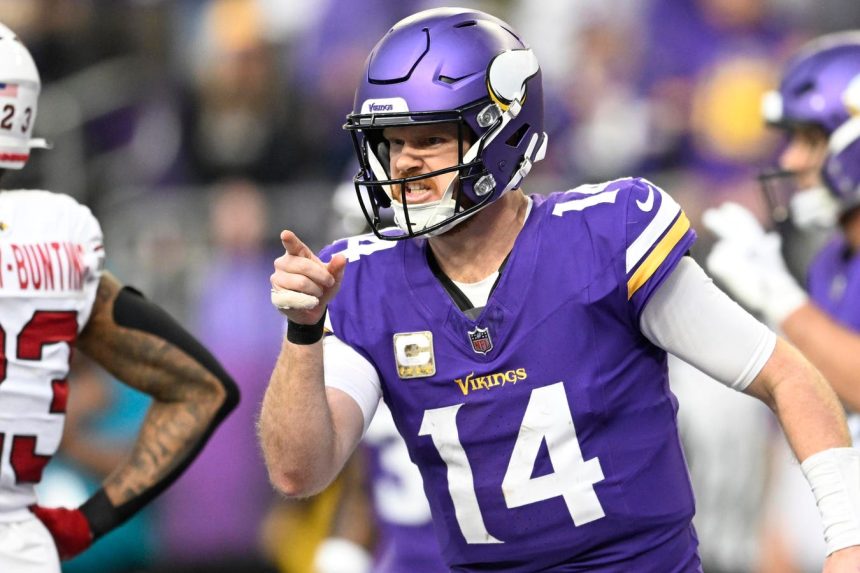The Minnesota Vikings have defied preseason expectations, transforming from predicted NFC North bottom-dwellers to legitimate Super Bowl contenders with an impressive 11-2 record. While the Detroit Lions, initially pegged as division favorites, have exceeded even the most optimistic projections with their 12-1 record and dominant 11-game winning streak, the Vikings have consistently outperformed the Green Bay Packers, solidifying their status as a force to be reckoned with. Meanwhile, the Chicago Bears, initially hyped after their appearance on HBO’s “Hard Knocks” and the acquisition of quarterback Caleb Williams, have experienced a dramatic fall from grace, plummeting to a 4-9 record after a promising 4-2 start.
The Vikings’ success is built on consistent performance, marked by a five-game winning streak at the beginning of the season and a current six-game run. They’ve demonstrated resilience, winning even when playing below par against teams like Jacksonville and Tennessee, and showcasing their ability to perform under pressure with a comeback victory against the Arizona Cardinals and a dominant performance against the Atlanta Falcons. While catching the Lions remains a significant challenge, the Vikings are within striking distance and possess a more favorable closing schedule, facing the Bears, Seahawks, Packers, and Lions, compared to the Lions’ tougher matchups against the Bills, Bears, 49ers, and Vikings. The tiebreaker, currently favoring the Lions due to their superior conference record, adds another layer of complexity to the Vikings’ pursuit of the division title.
At the heart of the Vikings’ turnaround lies head coach Kevin O’Connell, a strong contender for Coach of the Year. O’Connell’s strategic offensive acumen, ability to maximize quarterback performance, and command of the locker room have been instrumental in the team’s success. He has instilled a winning mentality and fostered a cohesive team environment that has enabled the Vikings to overcome adversity and maintain their competitive edge throughout the season. His leadership stands as a testament to the transformative power of effective coaching in the NFL.
Quarterback Sam Darnold, a surprise standout, has emerged as a potential MVP candidate, particularly after a scorching three-game stretch where he averaged 304 passing yards per game with a remarkable 9-0 touchdown-to-interception ratio. Darnold’s performance has significantly exceeded expectations, showcasing remarkable growth after six unremarkable seasons prior to signing a modest one-year, $10 million contract with the Vikings. He currently contends with the likes of Jared Goff, Josh Allen, Saquon Barkley, and Lamar Jackson for the MVP award, with his standing potentially rising further should the Vikings surpass the Lions in the division race.
Beyond the coaching and quarterback play, wide receiver Justin Jefferson continues to be a game-changer. Despite facing constant double coverage, Jefferson has amassed impressive statistics, with 75 receptions, 1,170 receiving yards, and 7 touchdowns. His presence on the field forces opposing defenses to dedicate extra resources, opening opportunities for other players like Jordan Addison and T.J. Hockenson to flourish. Addison has emerged as a big-play threat with 44 receptions, 708 yards, and 7 touchdowns, while Hockenson has provided a reliable target with 27 receptions and 299 yards after recovering from a knee injury. The ability of these players to contribute significantly in the receiving game adds further depth and unpredictability to the Vikings’ offensive strategy.
While the passing game has been a key component of the Vikings’ success, running back Aaron Jones presents a complex dynamic. His talent is undeniable, evident in his 893 rushing yards, 4 rushing touchdowns, 302 receiving yards, and 37 receptions. However, his persistent fumbling issues, including 5 fumbles in total with 4 in the last 3 games, pose a significant concern. Despite Coach O’Connell’s expressed confidence in Jones, overcoming this persistent issue remains crucial for the Vikings to avoid crucial turnovers and maintain offensive momentum in high-stakes games.
Bolstering the Vikings’ offensive firepower is a formidable defense ranked 6th in the league, allowing just 18.5 points per game. Their run defense, second only to the Baltimore Ravens, surrenders a mere 87.2 yards per game. Orchestrated by defensive coordinator Brian Flores, the defense has undergone a significant transformation, with key contributions from newcomers Blake Cashman, Jonathan Greenard, and Andrew Van Ginkel. Cashman’s impressive statistics of 73 tackles, 3 sacks, 6 tackles for loss, and 6 passes defensed exemplify the impact of these new additions. The leadership and experience of safeties Josh Metellus, Harrison Smith, and Cam Bynum, the team’s top tacklers, further solidify the defensive unit’s strength and reliability.
The Vikings have unequivocally demonstrated their legitimacy as NFC contenders, exceeding all preseason expectations. The remaining four weeks of the regular season will determine whether they can achieve their ultimate goal of securing the top spot in the standings – a prospect that seemed unimaginable just a few months ago. The confluence of coaching excellence, quarterback performance, offensive firepower, and defensive resilience positions the Vikings as a true threat, with a realistic chance of reaching the pinnacle of success in the NFL.



